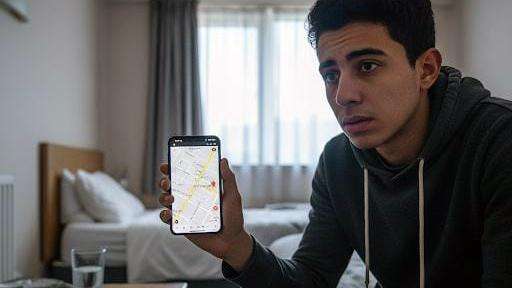In a powerful and deeply revealing account, an asylum seeker named Khaled has shed light on the pervasive fear and stigmatization faced by individuals seeking refuge in the UK. Fleeing the war-torn country of Syria, Khaled's journey brought him to the UK via a small boat across the English Channel, a perilous route that many have not survived. Now, in his new, unfamiliar home, he faces a different kind of danger: a constant barrage of suspicion and hostility fueled by misinformation.
Khaled's story is one of profound vulnerability. He has been forced to adopt a new, heartbreaking routine: checking Google Maps before he leaves his temporary accommodation to ensure he doesn't walk past any schools. This is not out of malice or any ill intent, but from a legitimate fear that he will be filmed and falsely accused of criminal activity. This fear is not baseless. Last week, in the Essex towns of Loughton and Waltham Abbey, baseless rumors spread like wildfire online after a man was seen near schools. Social media accounts, in a disturbing display of prejudice, immediately linked him to the Bell Hotel in Epping, which houses asylum seekers, and falsely claimed he was attempting to access school premises.
Essex Police have since released a statement directly refuting these claims. They confirmed that the individual in question was a rough sleeper looking for food in bins on school playing fields, and had made no threats or attempts to enter school buildings. The police statement, released on September 18, highlighted the need for communities to contact them directly to allay fears instead of relying on inaccurate social media commentary. This incident, while officially debunked, has had a lasting and devastating impact on asylum seekers like Khaled, forcing them to live in a state of self-imposed confinement to avoid baseless accusations.
"People in the area started saying that we were criminals," Khaled told the Socialist Worker. "Because we walk around together, they said that we were in a gang. But we are just kids in a new country, we are afraid. We don't know what to do or where to go, we are just sticking together. We are not doing anything wrong."
His words expose the deep isolation and dehumanization that asylum seekers experience. The simple act of seeking safety in a group is misconstrued as gang activity, turning a gesture of mutual support into a source of suspicion.
When confronted with the common refrain, "Why didn't you come by legal routes?", Khaled offers a poignant and practical response. "I say, there are no legal routes," he explains. He also addresses the cruel question of leaving his family behind. "They say 'how can you leave your family, your mother and sister?' I say that I wouldn't put my mother in a boat. It took me months to get here. Many people die trying to get here."
His journey from Syria is not just a personal story but a microcosm of the larger humanitarian crisis. In recent years, Syria has been a significant country of origin for asylum seekers in the UK, although recent data indicates a shift in the most common nationalities. The asylum process for Syrians has been fraught with uncertainty. A temporary pause on processing Syrian asylum claims, which began in December 2024, was lifted in July 2025. This has left many, who have been in the UK for a significant period, in a state of limbo.
The housing of asylum seekers, like Khaled and others at the Bell Hotel, has been a contentious issue. The government's reliance on hotels for temporary accommodation has been met with legal challenges and community protests. The Home Office is required by law to provide accommodation for destitute asylum seekers while their claims are being processed, but the lack of consultation with local communities has created fertile ground for anti-migrant sentiment. The use of hotels, and other large-scale sites, has been criticized for poor conditions and the mental health strain it places on residents.
Khaled's final statement offers a powerful rebuttal to the narrative that pits asylum seekers against the homeless. "They say that we have the homeless in this country, but the government could house all of us if they wanted to. It's not us or them." His words highlight a core issue: the perceived conflict between native and newcomer is a false one, masking the government's failure to address the housing crisis for all vulnerable populations.
As Khaled and other asylum seekers navigate their lives in the UK, they face a daily battle against misinformation, prejudice, and a system that is often slow and unresponsive. Their stories are not just about seeking a new home, but about the profound struggle to simply exist without fear.








.svg)
